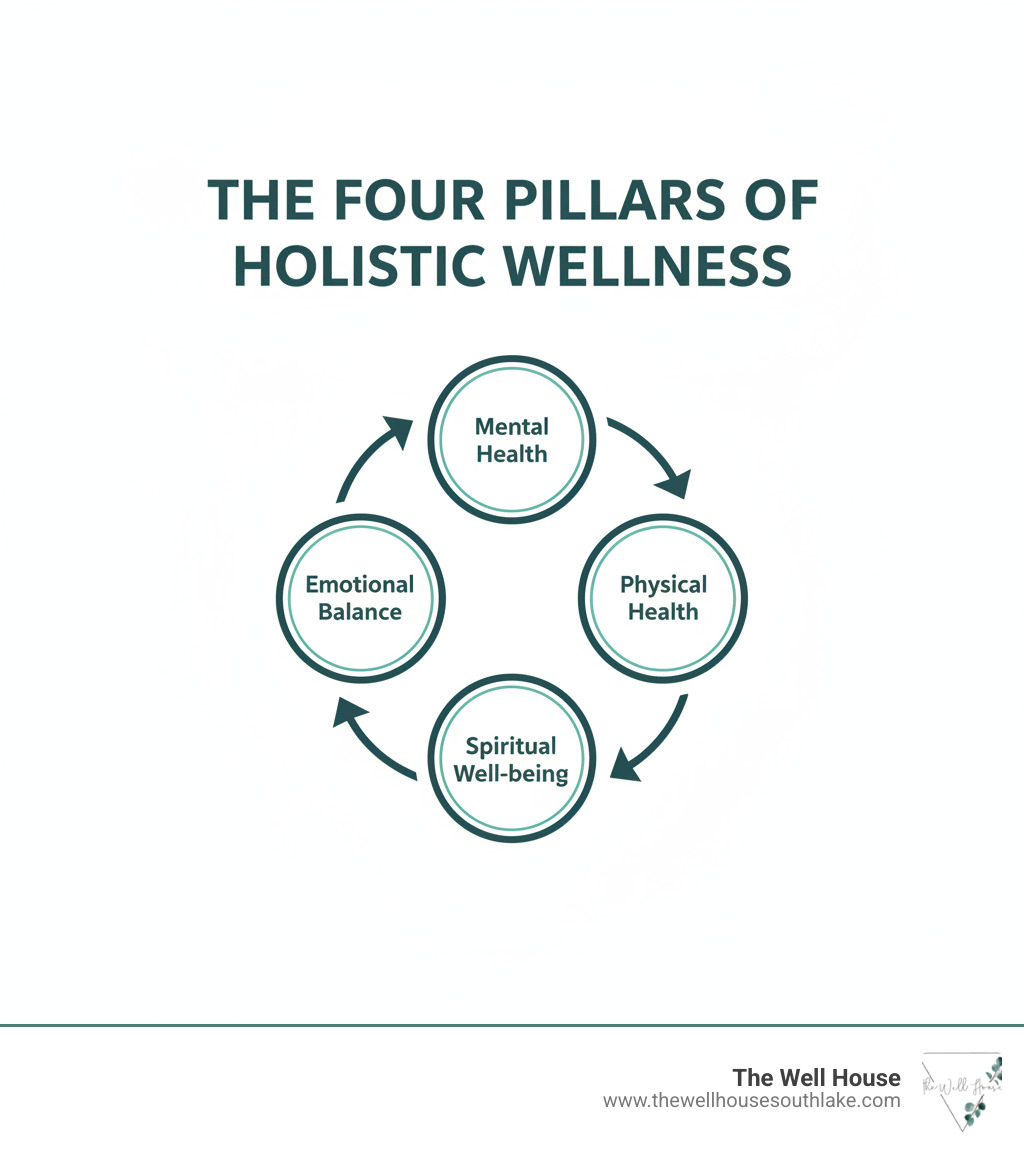What is Holistic Counseling? An Integrative Path to Healing
Why Whole-Person Healing Matters Now More Than Ever
Holistic approach counseling is a therapeutic method that treats you as a complete person by addressing your mind, body, and spirit together. This integrative path recognizes that your mental, physical, emotional, and spiritual well-being are deeply interconnected.
What makes holistic counseling different:
- Whole-person focus: Considers all biological, psychological, social, and spiritual dimensions.
- Root cause exploration: Looks beyond symptoms to understand underlying issues.
- Integrative techniques: Blends talk therapy with body-centered practices and mindfulness.
- Client empowerment: Emphasizes your active role in your healing and growth.
- Prevention-oriented: Builds long-term wellness, not just short-term symptom management.
If you’re feeling overwhelmed, anxious, or disconnected, holistic counseling offers a compassionate path forward. It’s not about fixing what’s broken; it’s about reconnecting with your wholeness.
Research supports this approach, showing that holistic interventions can reduce stress, anxiety, and depression more effectively than symptom-focused care alone. Practices like diaphragmatic breathing, meditation, and somatic therapy create measurable improvements in emotional regulation and trauma recovery.
Holistic counseling meets you where you are, honoring your unique journey and natural capacity for healing, whether you’re navigating trauma, a life transition, or simply seeking more balance.
I’m Jennifer Kruse, a Licensed Professional Counselor Supervisor dedicated to a soul-mind-body approach, the essence of holistic approach counseling. I believe everyone has the capacity for change when supported with compassionate, integrative care.

Common holistic approach counseling vocab:
Understanding the Holistic Philosophy: Mind, Body, and Spirit
You are more than a collection of symptoms. You are a complex person where your mind, body, and spirit are constantly in conversation—influencing and supporting one another. This interconnectedness is the heart of holistic approach counseling. At The Well House, we’re curious about all of you: how your body feels, what you believe, how you’re sleeping and eating, and what brings meaning to your life.
This philosophy isn’t new. Ancient traditions like Ayurveda and Traditional Chinese Medicine, and physicians like Hippocrates, have long understood that health is a balance across all aspects of life. As The American Holistic Nurses Association (AHNA) explains the holistic view on mental health, the root of a problem is often more complicated than what medication alone can address, involving factors like nutrition, trauma, or changes in neural pathways.
Think of it this way: chronic stress causes physical tension, exhaustion harms your mood, and a lack of purpose makes everything feel harder. These aren’t separate problems—they’re pieces of the same puzzle.
Core Principles of Holistic Counseling
Our therapeutic relationship is built on several core principles:
We focus on you as a whole person. We’re interested in your physical health, sleep, nutrition, relationships, work, and spiritual beliefs to understand the full context of your life.
We dig for root causes, not just surface symptoms. We help you develop coping strategies while also exploring why you’re struggling, creating the possibility for lasting change.
We believe you are the expert on your own life. Our role is to provide guidance and tools. We empower you to trust your own wisdom and build genuine resilience.
We help you cultivate deeper self-awareness. Understanding your thoughts, emotions, and patterns helps you respond to life’s challenges thoughtfully rather than reactively.
We support your personal growth, not just your healing. We want to help you flourish by identifying your strengths and finding what a meaningful life looks like for you. Holistic approach counseling is about finding who you’re truly meant to be.
Holistic vs. Traditional Counseling: A Key Distinction
While both are valuable, there are important differences:
| Aspect | Traditional Talk Therapy | Holistic Counseling |
|---|---|---|
| Focus | Primarily on symptoms and immediate concerns. | On the whole person, covering biological, psychological, social, and spiritual aspects. |
| Scope | Often confined to mental and emotional issues, sometimes addressing symptoms in isolation. | Broad, integrating mind, body, and spirit, recognizing their interconnectedness. |
| Techniques | Primarily talk therapy (e.g., CBT, psychodynamic therapy). | Integrates traditional talk therapy with diverse modalities like mindfulness, somatic practices, nutrition, and energy work. |
| Goal | Symptom reduction and coping strategies. | Holistic healing, overall well-being, personal growth, and addressing root causes for lasting change. |
| Approach | Often therapist-led, focusing on specific diagnoses. | Collaborative, client-empowered, emphasizing self-awareness and self-regulation. |
Traditional therapy often focuses on managing what’s wrong. Holistic counseling asks, What’s possible? What does wholeness look like for you? At The Well House, our collaborative counseling approach combines evidence-based techniques with integrative practices to honor your full humanity.
Techniques and Modalities in Holistic Approach Counseling
At The Well House, we know you are unique—and your healing path should be too. Holistic approach counseling draws from a rich palette of therapeutic techniques, blending traditional methods with complementary practices that honor your mind, body, and spirit.
Think of it as an orchestra: talk therapy may be the foundation, but we add breathwork, mindfulness, and body-centered practices to create a healing experience that resonates with all of you.
Through our Collaborative Counseling Southlake TX model, we may weave these techniques into your sessions or connect you with trusted specialists, building a comprehensive care team around you.
Mind-Centered Techniques
These techniques help you develop a healthier relationship with your inner dialogue.
- Mindfulness and Meditation: Mindfulness is the art of being present without judgment. It brings you back to the moment when anxiety or depression pulls you elsewhere. Meditation trains your attention to achieve mental clarity and calm. Research on the benefits of meditation and mindfulness consistently shows these practices reduce stress and anxiety.
- Guided Imagery: This technique uses your imagination as a healing tool, creating vivid mental scenes that promote relaxation and well-being.
- Cognitive Behavioral Therapy (CBT): This evidence-based approach helps you identify and challenge unhelpful thought patterns and behaviors, giving you practical tools for the long term.
Body-Centered (Somatic) Practices
Your body remembers what your mind tries to forget. Stress and trauma can settle into your nervous system. Body-centered practices are crucial for releasing this stored tension.
- Somatic Experiencing: This gentle, body-oriented therapy helps you heal trauma by paying attention to physical sensations, allowing them to complete their natural cycle without having to relive the story in detail. A study on somatic breathing for PTSD suggests this approach is highly effective.
- Breathwork: Your breath is a direct line to your nervous system. We teach techniques like diaphragmatic breathing to shift you from a stressed state to a calmer one, though we always move at a pace that feels safe for you.
- Yoga: This practice integrates movement, breath, and meditation. Trauma-informed yoga can be especially helpful for those in recovery.
- Nutritional Guidance: What you eat affects your mood and energy. We’ll discuss how your diet might be impacting your mental health and connect you with specialists when needed.
- EMDR Therapy: For those dealing with trauma, we offer EMDR Therapy in Southlake, TX. This powerful therapy helps your brain process distressing memories and reduce their emotional charge.
Spirit and Energy-Based Modalities
Healing often involves addressing your spiritual dimension—your sense of meaning, purpose, and connection. We honor your spiritual journey, whatever that looks like.
- Spiritual Guidance: We create space to explore your beliefs, values, and sense of purpose, which can boost self-esteem and motivation.
- Art Therapy: This offers a way to express what words cannot, allowing you to explore emotions and release stress through a creative process.
- Reiki: A gentle energy healing technique using light touch to promote relaxation. A 2019 study on Reiki for depression and anxiety found it could reduce symptoms and improve quality of life.
- Tai Chi and Grounding: Tai Chi combines slow movements with deep breathing for stress reduction. Grounding techniques are simple practices that anchor you in the present moment when you feel overwhelmed.
We also recognize the value of practices like acupuncture, massage, and cranial sacral therapy, and can connect you with trusted practitioners in these areas. The beauty of holistic approach counseling is that we create a personalized healing plan that draws from this rich toolkit to support you fully.
The Benefits and Applications of a Holistic Perspective
When you choose holistic approach counseling, you stop just surviving and start truly living. The goal isn’t just to “cope” but to find a deeper sense of wholeness.
The benefits are profound: improved overall wellness, a stronger capacity for self-regulation, and a nervous system that can shift from fight-or-flight to a state of calm. Perhaps most importantly, you gain increased self-awareness—an inner compass that guides you toward choices that serve your well-being.
Who Can Benefit from a holistic approach counseling?
This approach is helpful for almost anyone, but especially for those dealing with:
- Anxiety: We help you understand how your body holds anxiety, teach you calming breathwork, and explore underlying thought patterns. Our Anxiety & Depression Counseling Southlake integrates these elements into a comprehensive plan.
- Depression: We look beyond mood to address how nutrition, sleep, movement, and social connection contribute to how you feel, helping you rebuild a sense of purpose.
- Stress and Burnout: If you’re running on empty, we provide practical, sustainable tools like mindfulness and lifestyle adjustments to prevent burnout. Our Stress Therapy Southlake is designed for this modern challenge.
- Trauma: Since trauma lives in the body, modalities like somatic experiencing and EMDR are powerful. Holistic counseling offers a path to process trauma without re-living it.
- Relationship Issues: Deeper self-awareness helps you show up differently in relationships, creating space for healthier patterns and more authentic connections.
- Personal Growth Seekers: You don’t have to be in crisis. If you want to live more intentionally and cultivate deeper joy, this approach provides a framework for that journey.
Integrating Holistic Practices into Your Daily Life
The real magic happens between sessions. These practices become lifelong companions for your well-being.
- Diaphragmatic Breathing: Just a few minutes of deep belly breaths can shift your nervous system from panic to peace. Research shows the effect of diaphragmatic breathing on stress is significant.
- Mindful Walking: Turn a daily walk into a mindfulness practice by paying attention to your senses, bringing you into the present moment.
- Gratitude Journaling: Writing down what you’re grateful for rewires your brain toward positivity.
- Setting a Daily Intention: Choose one word for how you want to show up each day (e.g., “patient,” “present”). This simple ritual can shape your entire day.
- Mindful Eating: Slow down and savor your food, listening to your body’s signals of hunger and fullness. It’s about honoring your body’s wisdom.
- Movement and Play: Dance, stretch, or engage in hobbies just for fun. Play is essential medicine for stress and joy.
Finding the Right Path: How to Choose a Holistic Counselor
Taking the step toward holistic approach counseling is an investment in your whole self. Finding the right counselor is the next crucial part of the journey. The relationship you build with your therapist—the trust and rapport—is one of the biggest predictors of successful therapy.
At The Well House, we understand this deeply. That’s why we offer Online Counseling and Therapy options, making it easier to connect with the right professional from anywhere in the Southlake, Westlake, Grapevine, Roanoke, or Trophy Club, TX areas.
What to Look for in a Holistic Therapist
- Check for a license. Look for credentials like LPC, LCSW, or LMFT. This ensures your counselor has met strict educational and ethical standards.
- Inquire about specialized training. Ask about certifications in modalities that interest you, like EMDR, somatic experiencing, or mindfulness-based therapies. This shows they have in-depth knowledge.
- Ask about their philosophy. Do they truly integrate mind, body, and spirit? A good holistic counselor sees you as an active partner in your healing.
- Use the consultation call. Many therapists offer a free 15-minute consultation. Use this to ask questions and see if it feels like a good fit.
- Trust your gut. The most important factor is finding someone you feel comfortable with and can eventually trust. Your intuition matters.
Practical Considerations for a holistic approach counseling
- Understand insurance coverage. Traditional talk therapy is often covered, but complementary practices like reiki may not be. Call your insurance provider to ask about mental health coverage, deductibles, and copays. You can also use HSAs or FSAs for some services.
- Be prepared for some out-of-pocket costs. Be transparent with your counselor about fees and payment options to avoid surprises.
- Session length is standard. Sessions are typically 45-50 minutes, often starting weekly and adjusting as you progress.
- Know the limitations. Holistic counseling requires your active participation. Healing is a process that unfolds over time, not a quick fix.
- Do not replace medical care. Holistic counseling should complement, not replace, conventional medical treatment. Always keep your medical doctor informed, especially before starting new practices or changing your treatment plan. Your counselor and doctor should work as a team.
Frequently Asked Questions about Holistic Counseling
If you’re considering holistic approach counseling, it’s natural to have questions. Here are some of the most common ones we hear.
How is holistic counseling different from integrative therapy?
There’s a lot of overlap, but the distinction is useful.
Holistic is the philosophy—the belief that you are a whole person (mind, body, spirit) and that all parts are interconnected. It’s the “why” behind the treatment.
Integrative therapy, on the other hand, is the practice—the “how.” It refers to blending different therapeutic techniques (like CBT and mindfulness) to create a personalized plan.
Essentially, all holistic approach counseling is integrative by nature because it draws from various methods to treat the whole person. At The Well House, our holistic philosophy guides our integrative practice.
Can holistic counseling replace medication for mental health?
No. Holistic approach counseling is a powerful complement to necessary medical or psychiatric care, not a replacement for it. Medication can provide crucial neurochemical support, while holistic practices address your lifestyle, stress, and overall well-being.
Many clients find that the skills they gain in holistic counseling improve their well-being and may, over time and under a doctor’s supervision, lead to medication adjustments. However, any changes to your medication must be made in consultation with your prescribing physician. We see ourselves as part of your care team, working alongside your doctor.
Is holistic therapy evidence-based?
Yes. While holistic approach counseling is a guiding philosophy, it incorporates numerous practices that are strongly supported by scientific research.
Techniques like Cognitive Behavioral Therapy (CBT), EMDR, mindfulness, meditation, and somatic therapies all have substantial evidence demonstrating their effectiveness for various mental health conditions. For example, studies show holistic stress management programs significantly reduce anxiety and depression, while practices like diaphragmatic breathing improve cognitive function.
At The Well House, we prioritize evidence-based practices within a compassionate, whole-person framework, offering you the best of both worlds.
Begin Your Journey to Whole-Person Healing
If you’ve made it this far, you’ve taken an important first step by learning about holistic approach counseling. That curiosity is the seed of change.
We’ve explored how addressing your mind, body, and spirit together creates a foundation for deep, lasting healing. This approach can soften anxiety, lift depression, and help release the grip of past trauma. You may find your relationships deepen and, most importantly, you’ll find a renewed, more authentic sense of you.
Holistic approach counseling isn’t about fixing what’s broken; it’s about remembering your wholeness. It’s about empowerment through self-awareness and building skills that serve you for a lifetime.
At The Well House, our collaborative approach means we partner with you on this journey. We bring our expertise in mind, body, and spirit wellness, and you bring your lived experience and innate wisdom. Together, we create a path forward that honors who you are.
Our diverse team offers specialized support for anxiety, depression, trauma, and more. We serve young adults, parents, individuals, and couples, with both in-person sessions in Southlake and telehealth options across Texas.
Taking the first step can feel daunting, but reaching out for support is an act of courage. You don’t have to have it all figured out. You just need to be willing to show up for yourself.
If you’re a young adult seeking support, find your path with Young Adult Therapy in Southlake, TX. To explore our other services, visit our website to learn how we can support you.
Your journey to whole-person healing begins now. We’re here to walk alongside you with compassion and expertise. You deserve to feel whole.









